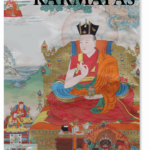| The following article is from the Spring, 2012 issue of the Snow Lion Newsletter and is for historical reference only. You can see this in context of the original newsletter here. |
BODHISATTVAS CLEARLY SEE THE DIFFERENT BARDOS (intermediate states) that constitute the field of experiences of ordinary beings within the cycle of samsara. There are six types of bardo: the bardo of birth, awakening, dreaming, the moment of death, becoming, and finally, meditation.
This last state is the only one that can arise at the same time as any of the others, whereas the state of awakening cannot overlap that of dreaming and so forth. It is for this reason that the great bodhisattvas who have achieved realization through meditation remain untouched by the ordinary circumstances developed by the five bardos; they remain continually in the space of meditation that transcends all others.
For this reason, bodhisattvas on the tenth ground, such as the Karmapas, are not sullied by the so-called veil of the womb that appears during the bardo of birth (or rebirth). For ordinary beings and bodhisattvas on lower grounds, entry into the mother's womb creates a shock that erases the memories of previous lives. However, once the bardo of meditation completely pervades the. five others, the state of nonmeditation (Tib. gom me) is attained, and there is nothing more than one lone, vast, lucid, peaceful, and extraordinary experience of continued bliss.
There is no more movement, no more back and forth from one life to another, no more loss or gain of anything. Thus there is no place from which to depart and nowhere to go. It is for this reason that we say the great bodhisattvas do not really leave, but from apparent death to apparent birth these bodhisattvas are said merely to be absent. This succession of reincarnations is also compared to a mala, a rosary, where the seeds are the different bodies supported by the same element, the string, which is like the mind. At the level of great bodhisattvas, time and space are no longer understood in the same way as ordinary beings understand them.
Adapted from History of the Karmapas


